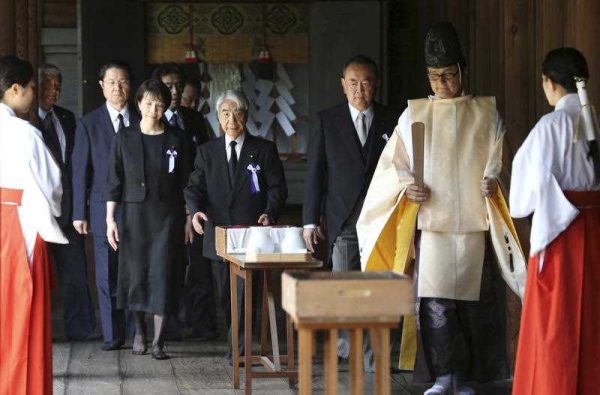Abe’s politics towards these issues appears to be influenced by Japan’s diplomacy during Democratic Party of Japan (DPJ) governance from 2009–12. A major policy of Abe’s predecessor Yukio Hatoyama, in power from 2009–10, was to embrace Japan’s neighbouring countries to build a stronger East Asian community. But the policy failed. It seemed that neither China nor South Korea was ready to be embraced by Japan. Instead, both countries used the opportunity to assert stronger claims on disputed territories. Abe’s current stance, in line with his overall political agenda of making Japan strong again, is a response to these events.
Abe often seems to have a dual personality: one pragmatic and the other nationalistic. On visiting the Yasukuni Shrine in December 2013, he emphasised that it was not his intention to hurt the feelings of Chinese and South Korean people. While reconfirming the Kono Statement in a speech in May 2013, he broke with tradition by not mentioning those killed by Japanese soldiers during World War II in another speech in August that year. In 2014, on the 69th anniversary of Japan’s defeat, Abe did not visit the Yasukuni Shrine, sending only a ritual offering. He also refrained from going to the shrine for the autumn festival.
This flip-flopping behaviour has been interpreted as an attempt to calm critics prior to the bilateral meeting with Chinese president Xi Jinping at APEC. Yet even Abe’s ostensibly pragmatic rhetoric and offerings to Yasukuni in lieu of personal visits still left a bitter taste and drew harsh responses from China and South Korea.
The South Korean government, for its part, seeks to capitalise on public anti-Japanese sentiment, especially toward politicians. Surveys have shown that Japan and Abe are perceived almost equally as bad as North Korea and Kim Jong-un.
The latest expression of this strategy could be seen when Kato Tatsuya, the Seoul bureau chief of the right-wing Sankei Shimbun, was charged for supposedly libelling South Korean president Park Geun-hye. Tatsuya had speculated about why it took Park seven hours to show up at the Central Disaster Management Headquarters on the day of the tragic Sewol ferry disaster. The president’s daily log, which was later released to public, only stated her absence but said nothing about what she had been doing. Moreover, the recent actions by the South Korean government have created a climate in which South Korean journalists can hardly write anything positive about Japan.
The aggressive rhetoric being pushed by Japan’s right-leaning media further compounds the Japan-ROK tensions. Japan’s biggest daily newspaper, the conservative Yomiuri Shimbun, has engaged in a campaign criticising the more liberal Asahi Shimbun for their coverage of the ‘comfort women’ issue. Their loud criticism targeted several Asahi reports that were based on the subsequently false testimony of Seiji Yoshida, a novelist and soldier in the Imperial Japanese Army.
While the Yomiuri Shimbun is right in discrediting these particular reports of women being forcibly taken, this does not fundamentally change the core of the issue. But the mistakes made by the Asahi Shimbun have been used as an opportunity to do exactly that.
After the UN rejected efforts by the Japanese government to revise a 1996 report which determined that so-called ‘comfort women’ had served as sex slaves, the Yomiuri Shimbun recently published three booklets on the issue. The arguments contained within them are quite disturbing. It is alleged that Korean men also sexually attacked Japanese women during the war, a line of thought also advanced by the extremely nationalistic Japan Institute for National Fundamentals. It is concerning that not only is this obscure think-tank prominently advertised by the Yomiuri Shimbun but also that a number of professors and journalists support and contribute to it.
It is time that Japan’s liberal internationalists raise their voices to drown the loud noises of the growing revisionist camp. China and South Korea should actively support such efforts instead of continuously criticising, but this would mean the end of capitalising on anti-Japanese public sentiment. For Japan, there would be nothing worse in its quest to revitalise its economy than being isolated any time in the near future.
Benedikt Buechel is a graduate student at the Seoul National University.


Japan needs to drown out anti-Japanese voices. We’re sick and tired of it all, Benedikt. It’s time for mutual respect. We won’t accept anything else.
Dear synopsis.today,
Being a Kantian in that sense, I totally agree with you that all persons are owed (moral recognition) respect. And so I ask you: “Do Japanese neoconservatives respect the dignity of the women who were forcefully held as sex slaves by the Imperial Japanese Army during World War II?” It is wrong when any politician capitalizes on anti-x sentiment in order to secure power.
I think a problem is that people are often not precise when they criticize. We should stop to generalize and speak of countries as a whole. Many sentences in which the words “Japan” or “South Korea” are used only inflame public opinion.
I would be pleased to hear your opinion and appreciate if you identify yourself.
よろしくお願いいたします
Sincerely
Benedikt